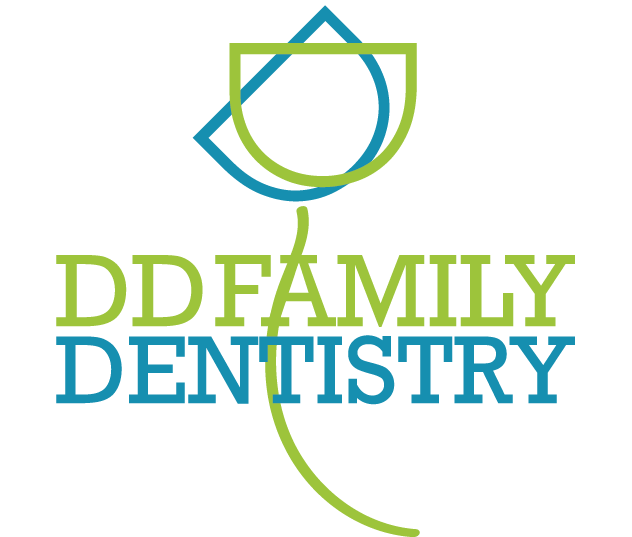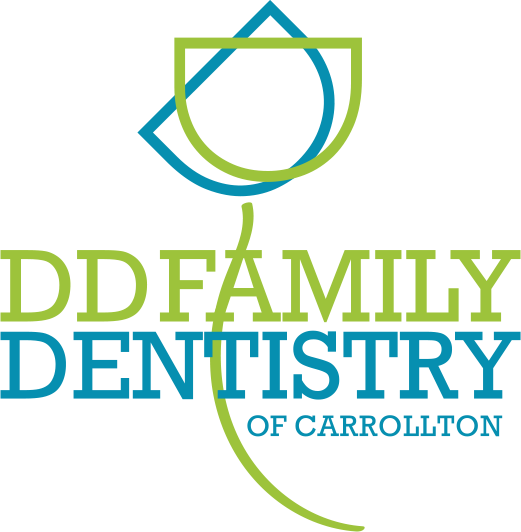Full & Partial Dentures Carrollton
Restoring Your Smile with Tried-and-True Prosthetics
Dentures have been around for hundreds of years, but they are still one of the most popular choices for tooth replacement even now for their affordability and convenience. And because of the materials and craftsmanship used to make dentures today, they look more lifelike than ever before! If you’re missing one or more teeth, it’s in your best interest to consider dentures in Carrollton further by calling to schedule a consultation with Dr. Durga.
Why Choose DD Family Dentistry of Carrollton for Dentures?
- Customized Prosthetics Designed for Patients’ Needs
- Trusted & Reputable Dentist in Carrollton
- Your Dental Insurance Benefits Maximized
What are Dentures?
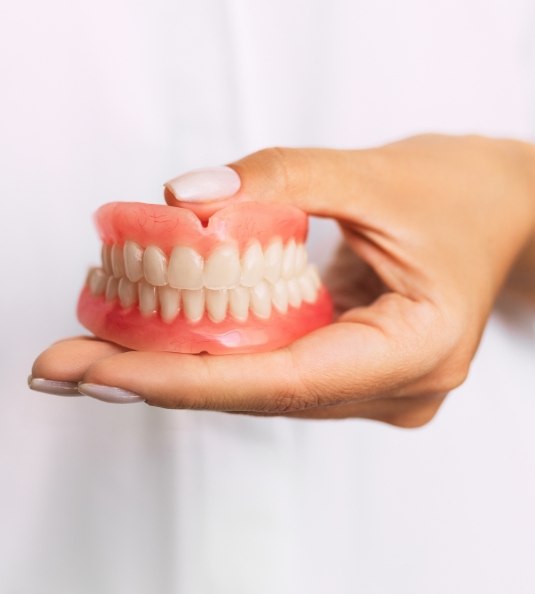
Dentures consist of prosthetic porcelain teeth that are attached to a plastic base colored to look like gum tissue. For easy cleaning and storage, they are generally made to be removable. Depending on the type, dentures are held in place by suction or by a metal clasp. Out of the tooth restoration options available, dentures typically have the lowest upfront cost.
Who's a Good Candidate for Dentures?

Regardless of how many teeth you’ve lost, anyone with gaps in their grin can potentially benefit from dentures. However, before proceeding, you must consult with one of our providers to verify that it’s the best solution for your unique needs. Don’t panic if you’re not approved right away; sometimes, additional procedures are needed so that you can move forward.
Continue reading to learn about the characteristics of a good candidate for this type of restoration, and feel free to contact us for more information.
Effects of Missing Teeth
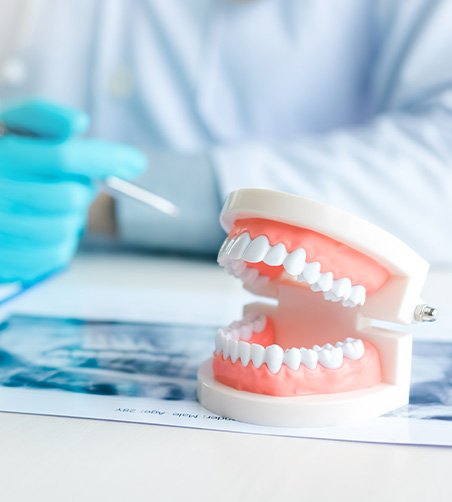
Many patients are surprised to learn that their jawbone begins to thin after teeth go missing. Under normal circumstances, the roots stimulate new bone growth in your jaw every time you bite down. Once it falls out, the bone structure becomes frail. It eventually becomes too weak to support your remaining teeth or facial structure, resulting in additional tooth loss, sunken cheeks, and additional fine lines in your face.
There are several potential causes of tooth loss, but the number one factor is gum disease. Plaque and bacteria in your mouth can penetrate the connective tissues to cause an infection. If the condition progresses, your gums start to pull away from your enamel, exposing and destabilizing the roots. Other common culprits behind tooth loss can include severe tooth decay or physical trauma.
What Qualifies You for Dentures?

At your consultation appointment, one of our dentists will examine your mouth to identify what type of dentures are needed. Then, depending on your circumstances, they’ll examine your dental condition to verify if you can safely support them.
For example, partial dentures include metallic clips that anchor to healthy teeth in your mouth, so we’ll ensure no cavities could interfere. Meanwhile, a complete set relies on a suction against your gums to remain in place all day, so you must have a clean mouth and sufficiently bony ridges for it to adhere to. If your jawbone is already too thin, you may be a better candidate for implant dentures, which may require a bone graft to bulk up your jaw before proceeding.
Alternative Tooth-Replacement Options
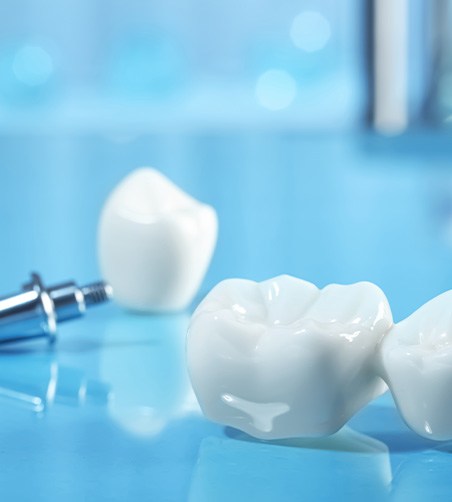
If our team finds that you’re not a good fit for these prosthetics, don’t worry! We offer alternative options to replace missing teeth that might benefit you, such as:
- Dental bridges. These are ideal for those who have lost one or several teeth consecutively. They include the correct number of artificial teeth with a dental crown on each end to bond to healthy teeth on both sides of the gap in your grin.
- Dental implants. This involves surgically placing titanium rods into your jawbone to function like roots, which are capped with an appropriate restoration (like a dental crown for a single tooth or dentures for an entire arch). This permanent solution is great for patients who struggle with ill-fitted dentures or who want to prevent jawbone degeneration.
Learn More About Dental Bridges
Learn More About Dental Implants
Types of Dentures
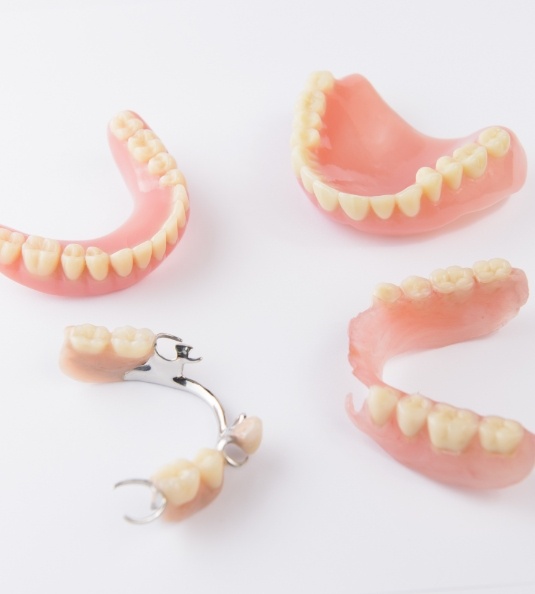
There are generally three kinds of dentures. At your consultation, Dr. Durga can help you determine which type of denture is the right choice for you.
Traditional Full Dentures
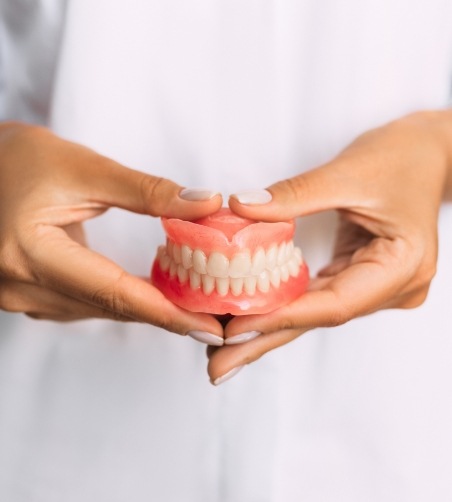
If you are missing all of your teeth, then you’ll need total replacement, which is exactly what full dentures offer. Although it can take a little while for your mouth to adjust to new dentures, we will make sure that your custom dentures fit comfortably.
Traditional Partial Dentures
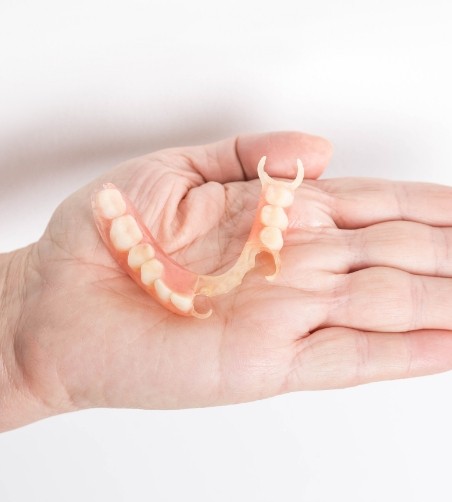
When you still have healthy teeth remaining in your mouth, partial dentures may be the right solution for you. Partial dentures are made on a metal framework that attaches to these teeth or uses a dental crown to anchor to them, helping them stay in place. But unlike dental bridges, partial dentures are still removeable.
Implant Dentures
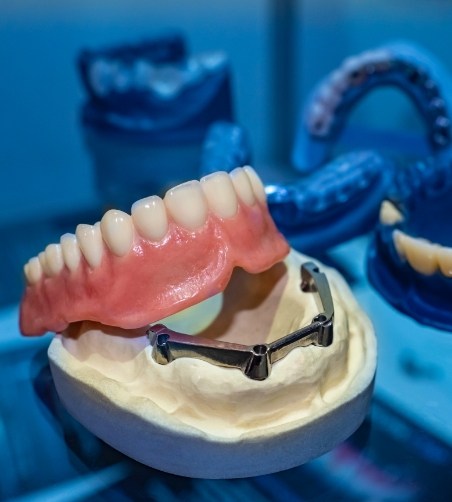
Implant dentures combine two types of teeth replacement into one option. Dental implants stimulate jawbone growth, which promotes your long-term oral health, and are exceptionally sturdy. By connecting your full or partial dentures to these implants, you can provide additional strength and stability to your dentures, preventing those awkward situations when your dentures slip or come loose.
How Long Do Dentures Last?
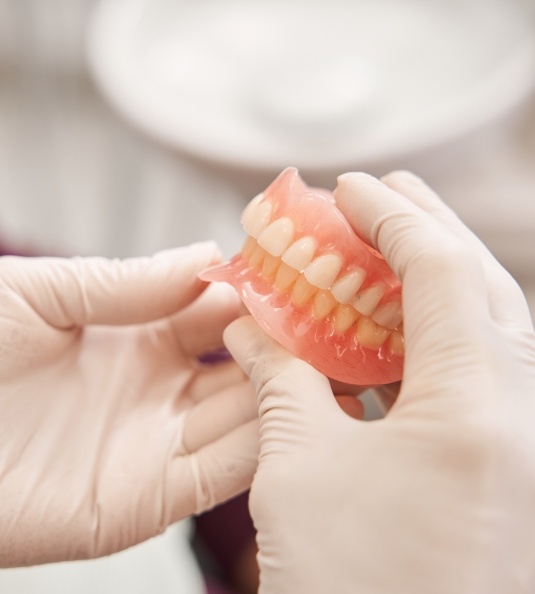
The lifespan of your dentures depends largely on you. If you follow care instructions and use proper maintenance, your dentures can last five to seven years before needing to be replaced. As an essential part of healthy oral habits, visiting Dr. Durga regularly for checkups helps ensure that your dentures are still working and fitting properly.
Our team is committed to helping you regain your smile and your confidence. We look forward to working with you and delivering results that you can trust for years to come. Schedule an appointment with us today to discuss your new dentures!
How Dentures Are Made

If you are considering dentures as a way to restore and rebuild your smile, you likely want to know all the details surrounding this type of treatment. From what is required to be a good candidate to how they’re placed and what you can do to prolong their lifespan, all are important to ensure you make the right decision. But have you thought about how dentures are made in Carrollton? Knowing what’s required to build these artificial teeth can shed additional light on your future smile and why it’s important to ensure they stay in the best possible shape.
What Are Dentures Made Of?

Whether you receive full, implant, or partial dentures, you can expect the foundational components to be the same. These prostheses have a denture base and artificial teeth, both of which can be further explained below:
- Denture Base: Depending on the dentist and laboratory used, the denture base can be crafted from many different materials, such as acrylic, resin, or nylon. Generally, acrylic is most common, as it can be color-matched to blend in with the natural color of your gum tissue. If a full denture is required, the base will be made to sit directly onto the gums; however, if a partial denture is what is requested, a metal framework will be crafted as part of the base to ensure it attaches to healthy teeth. Implant dentures incorporate small holes that allow them to snap into place over the top of the metal posts and abutments.
- Artificial Teeth: A base is nothing without artificial teeth. Commonly made from porcelain or resin, your denture dentist will ensure each tooth is positioned correctly so that your new smile looks natural and functions correctly. The reason for the choice of material is because of its ability to reflect light much in the same way regular tooth enamel does.
The Denture Creation Process

The denture creation process cannot be rushed. Each step is pivotal to the success of these teeth, so while it can take time, it’s ultimately worth the wait.
Your dentist will start by taking impressions of your teeth and measurements of your jawbone. This will help create a wax model of your mouth so that lab technicians can begin to more accurately build your new smile. An articulator is used to customize the model and ensure everything moves appropriately before filling the mold with plaster. This encourages the shape of your dentures to form before the wax is melted.
After the plaster hardens, the desired material is poured into the mold (i.e., acrylic), allowing the dentures to move one step closer to their final appearance. After the acrylic hardens, the plaster is removed before your dentures are given an ultrasonic bath. This removes any remaining plaster before excess acrylic is cut away.
Once the prosthetic is given a final polish, it will be returned to your dentist’s office so that you can begin to enjoy your new smile.
Adjusting to Your New Dentures

After receiving your new dentures, you can expect there to be some slight discomfort. Your mouth will need to adjust to the new materials inside your mouth; however, this should only be temporary. Before long, your dentures will feel normal and be easy to use. Over time, though, you can expect there to be a change in the way your teeth fit, so the moment you notice a difference, make sure to call our office to inquire about having them relined or replaced.
The Benefits of Dentures
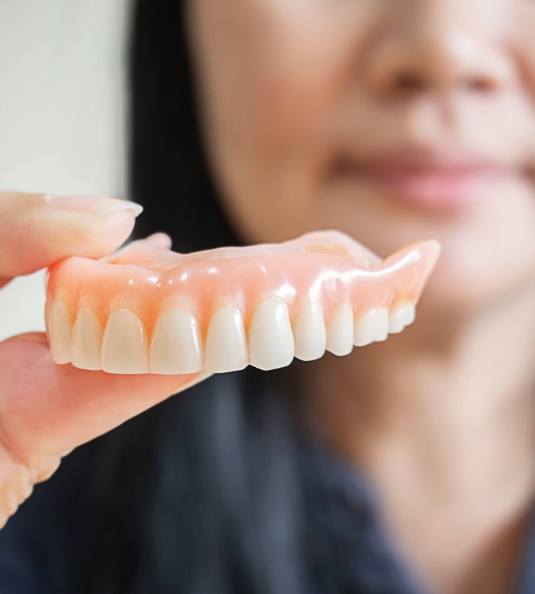
If you’ve spent any amount of time without all your teeth, you probably know all the ways having an insufficient smile can affect you. It’s not just about filling in the gaps—having a complete smile can be a truly life-changing improvement! In fact, when you get dentures, you can enjoy many benefits and advantages that you didn’t have without tooth replacements.
Psychological Benefits

Although teeth are small, missing some in your smile can have a drastic effect on your self-esteem. On the other hand, when you have a complete set of teeth with dentures, you can feel confident in yourself again. Feeling better about your smile can improve your mood because you’re more likely to let your smile show more often, which produces “happy” hormones in the brain, helping you feel better about life overall.
Clearer Enunciation

Even if you’ve lost only a couple of teeth, you may hear a difference in the way you talk. Certain sounds require teeth, including t, th, v, f, and others. Trying to communicate can become incredibly frustrating and embarrassing if you can’t form these sounds. Fortunately, dentures fill in the gaps and allow you to enunciate properly. Keep in mind that it may take a little bit of time to adjust to speaking with your new dentures, but others should be able to understand you much better!
Improves Nutrition

Although there are exceptions, nutritious food often requires quite a bit of biting and chewing, which can become difficult if you don’t have all your teeth. As a result, many people who are missing pearly whites often choose more processed foods that are softer and easier to eat, but these choices can lead to other health complications or challenges. Dentures can put better fruits, vegetables, whole grains, and more back on the menu, helping you lead a healthier lifestyle.
Preserves Oral Health

When teeth are lost, the jawbone no longer receives nutrients, and it collapses over time. Traditional dentures can keep the lower jaw properly spaced, reducing the sunken look that comes with severe tooth loss. Implant dentures go a step further and actually keep the jawbone stimulated and strong. As a result, you can keep your restored smile and a more youthful appearance for decades or the rest of your life!
Expands Opportunities

Regardless of your situation, age, or stage in life, there are opportunities for growth and happiness, and having a whole, confident smile can open doors for you socially, professionally, and in other ways. Like it or not, others’ perceptions and judgment of you can be influenced by your smile, which means that dentures can help you achieve your goals.
Understanding the Cost of Dentures

Dentures are a tried-and-true tooth replacement solution that countless patients invest in, and most agree that it’s well worth it! Our team wants to make sure that our patients’ restorations are crafted to not only appear lifelike but to also function naturally within the mouth, allowing for enhanced eating and speaking abilities. While the cost of dentures can vary based on each patient’s needs, we can provide you with an estimate at your initial consultation once we’ve had an opportunity to plan your treatment.
Factors That Affect the Price of Dentures
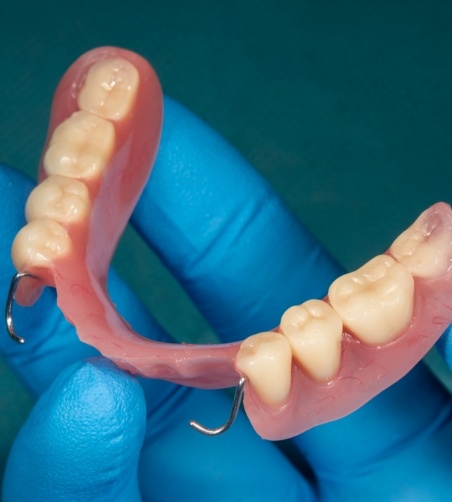
Several different factors can impact the cost of dentures, and we’ll be sure to lay out each of your options for you during your initial appointment. Some cost-determinants include:
- Whether you require any preparatory work, such as tooth extractions or gum disease therapy.
- How many teeth you’re missing, and whether you need a full or partial denture.
- What type of materials you’d like to have your dentures crafted from.
If your goal is to save as much money as possible, we recommend that our patients think about the longevity of the materials they’re choosing and whether they’ll be happy with them. In many cases, the least expensive option isn’t always the best choice for your unique needs. In any case, we’ll make sure to discuss each of these potential factors with you.
Are Implant Dentures More Expensive?
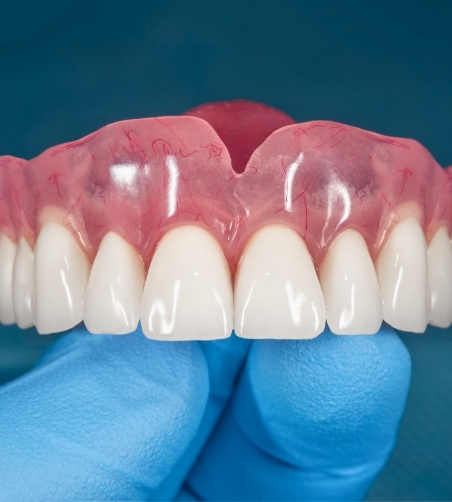
While implant dentures have a higher upfront cost, they have a longer lifespan, making them the most cost-effective solution in the long run. In addition to offering traditional implant dentures, we also offer All-On-4, which can be secured to four dental implants that are strategically placed in the jawbone for maximum support.
Does Dental Insurance Cover Dentures?

Most dental insurance companies will cover at least a portion of the cost of dentures; however, it’s important to keep in mind that every policy’s coverage can vary. To determine how much your benefits will cover for your treatment, it’s best to contact your insurance company directly. Our team is proud to be in-network with most major PPO plans, including Aetna, BlueCross BlueShield, and Guardian, and we’re happy to help our patients maximize their benefits.
Other Options for Making Dentures Affordable

In addition to accepting dental insurance, we also offer an in-house membership plan for a low monthly fee of $29. It will provide you with discounts on several of our treatments so you can pay less while still getting the smile of your dreams.
Dentures Aftercare

Dentures from DD Family Dentistry can keep your smile beautiful and functional for many years after tooth loss, but that’s only if you take excellent care of them. After receiving your appliance, proper oral hygiene and denture maintenance practices will be essential to maintaining the health of your smile. Regular dental checkups will also be necessary so our dentist can inspect your mouth for signs of infection and address issues in their early stages. Here’s a brief guide to proper denture care to help you keep your new teeth in excellent shape.
Removable Dentures

Remove After Eating
Remove and thoroughly rinse your dentures after each meal to prevent accumulations of plaque and food residue. Never use hot water, as the temperature shift can warp your dentures and ruin their fit.
Clean Your Restoration
Always remove your dentures before cleaning them. Begin by gently treating them with a soft-bristled toothbrush and a little bit of unscented hand soap, mild dish soap, or an approved denture cleanser. Remember not to use regular toothpaste, as it is abrasive and can scratch your appliance. If you aren’t wearing your dentures immediately afterward, store them in a container of water or denture cleanser to prevent them from drying out and warping. Always thoroughly rinse your dentures after soaking, as the cleaning materials used can be hazardous if swallowed.
Keep Your Dentures Safe
Always place folded towels across your countertop and fill the basin of your sink with lukewarm water to create a cushion before removing your dentures for cleaning. It’s also important to keep your appliance away from the reach of pets and small children.
Remove Dentures When You Sleep
Continuous denture wear can lead to oral irritation and infections that can eventually cause them to lose their fit, and sleeping with your dentures is also associated with increased risks of pneumonia and plaque accumulations. To prevent this, remove and soak your dentures before going to bed so your mouth has time to relax and clean itself. Always soak your dentures when not wearing them to prevent them from losing their shape.
Notice Changes
Pay attention to changes in the way your dentures look and feel and report any you find to our dentist. A few key things to look out for include oral sores, gum irritation, or signs of infection. If your appliance is damaged, never attempt to repair it yourself, as you may only damage them further. Call our office if your dentures break or if they show signs of not fitting properly such as clicking or shifting so we can address the issue.
All-on-4 Dentures
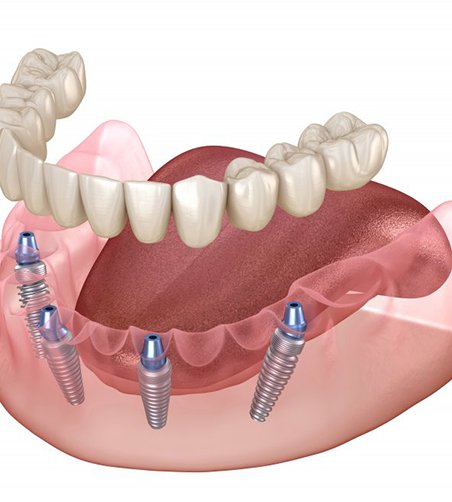
Brush your dentures twice daily with a soft-bristled electric or manual toothbrush and non-abrasive toothpaste that contains no stain-removing agents like charcoal or baking soda. It’s also important to floss your artificial teeth at least once a day, and floss threaders may help you clean beneath your appliance. Some patients find that water flossers make cleaning their appliances much easier, and many report that sulcus brushes are great for cleaning underneath dentures. You should also rinse with antibacterial mouthwash daily to deter the growth of tartar.
Denture FAQs
Can I sleep with my dentures?
You don’t want to be seen without your teeth, but you’ll need to remove your dentures at night. Initially, you’ll be advised to wear them for a full 24 hours, even while sleeping. After the first day, it’s best to take your dentures out at night to give your gums time to recuperate. Supporting your dentures all day decreases circulation in your gums. Removing them allows your gums to get the nutrients they need to prepare for the next day. The short break reduces your risk of irritation, infections, and ridge resorption. Besides keeping your gums healthy, your dentures need a good cleaning before heading to bed. Your mouth is a dark, moist environment, which is ideal for harmful bacteria. It can quickly multiply, leading to bad breath, infections, and even denture damage. A thorough cleaning each night will combat bad bacteria to keep your smile healthy. Besides soaking your teeth in a denture solution, clean your gums and the inside of your mouth before calling it a night.
Do upper dentures always cover the palate?
Dentures come in a variety of shapes and styles, which means the upper arch won’t always cover the palate. Although some people prefer this style, it can diminish the taste of food. Palate-less options are available, which look like a lower denture. The horseshoe shape is also used along with implant dentures. Don’t worry, your denture dentist will explain all your options and help you make the right decision for your smile.
Do I use regular toothpaste to clean my dentures?
Although your dentures will function like your real teeth, they can’t be brushed the same way. You should clean and rinse your dentures at least once a day but don’t use regular toothpaste for the job. Most toothpaste is abrasive, which can cause small scratches on the surfaces of your dentures. Bacteria, plaque, and food particles can get trapped in the tiny crevasses, leading to discoloration, odors, and infections. Not to mention, it can shorten the lifespan of your new teeth. Instead, it’s better to use nonabrasive dental products, like a soft-bristled toothbrush. Use mild hand soap or denture cleaner to brush all surfaces of your replacement teeth. Don’t forget to brush your gums, tongue, and the inside of your cheeks. Never expose your dentures to heat to sterilize them because they will warp. You can keep it sparkling clean and sanitized using a denture-soaking solution.
Do Dentures Break Easily?
Dentures are crafted from only the best dental materials, so they are extremely durable. Of course, that doesn’t mean they are indestructible; there’s a chance that they will break if they fall into your sink or onto the bathroom floor. That’s why we encourage our patients to clean their restoration over a soft surface, like a towel. It’s also a good idea to get into the habit of placing them in their designated case when you aren’t wearing them to prevent them from accidentally getting lost or damaged.
Should I Have All My Teeth Pulled to Get Dentures?
If you have a few of your natural teeth left, but they are decayed or damaged beyond the point of repair, then you should have them removed before getting dentures. That said, we don’t recommend having healthy teeth removed to make room – that’s what partial dentures are for! With this type of restoration, we can seamlessly fill the gaps in your smile, improving your self-esteem and preventing dental drift in the process.
Am I Too Young to Get Dentures?
There’s a common misconception that dentures are only for seniors. The truth is that – aside from infants, toddlers, and very young children – this restoration can help patients of all ages! So, if you or a loved one are struggling with low confidence, difficulty chewing, and trouble enunciating clearly following tooth loss, don’t hesitate to schedule a consultation with our Carrollton dental team. That way, we can review all of the treatment options available, including traditional dentures.
Is It Hard to Talk with Dentures?
Fortunately, modern dentures are custom-made for each patient, ensuring they don’t protrude unnaturally or feel bulky. That said, it is normal for patients to experience a bit of a learning curve. The easiest way to adjust is by practicing. Try reading your favorite book out loud, reading the back of your shampoo bottle while you shower, and conversing with a trusted friend so you can get the hang of speaking with them.
Tip: Before you start talking, bite down to ensure your dentures are in the proper position. Then, swallow to remove excess saliva. This will help prevent your restoration from sliding and your speech from getting muddled.
Why Do My Dentures Smell?
If your dentures are starting to smell, it may be because bacteria is trapped in the various nooks and crannies. So, try cleaning them thoroughly with a soft-bristled toothbrush before soaking them in a dentist-approved cleaner. If that doesn’t do the trick, give us a call! The culprit of the odor may be something else, like an untreated oral health problem.
Can You Still Eat Steak with Dentures?
Tough meats are difficult to chew, so we don’t recommend it. That said, you can eat steak if you take the right precautions, like making sure it’s thoroughly tenderized beforehand and that you cut it into smaller, manageable pieces with your fork and knife.
